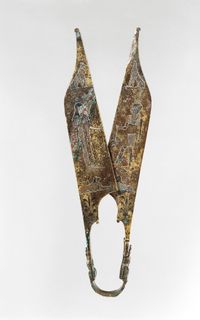
Hairpin with a Figure of a Hippopotamus
An item at Metropolitan Museum of Art
The figure of an erect hippopotamus represents a goddess invoked as the protector of women in pregnancy and childbirth. Known as Ipi or Taweret ("The Great One"), she is often depicted with a crocodile stretched over her head and along her back. In the form of a hairpin, the goddess was intended to guard its wearer from harm. For an illustration of how the hairpin was used, see 26.3.353ww.
Egyptian Art
An exhibit at Metropolitan Museum of Art
The Met collection of ancient Egyptian art consists of approximately 30,000 objects of artistic, historical, and cultural importance, dating from about 300,000 BCE to the 4th century CE. A signifcant percentage of the collection is derived from the Museum's three decades of archaeological work in Egypt, initiated in 1906 in response to increasing interest in the culture of ancient Egypt.




